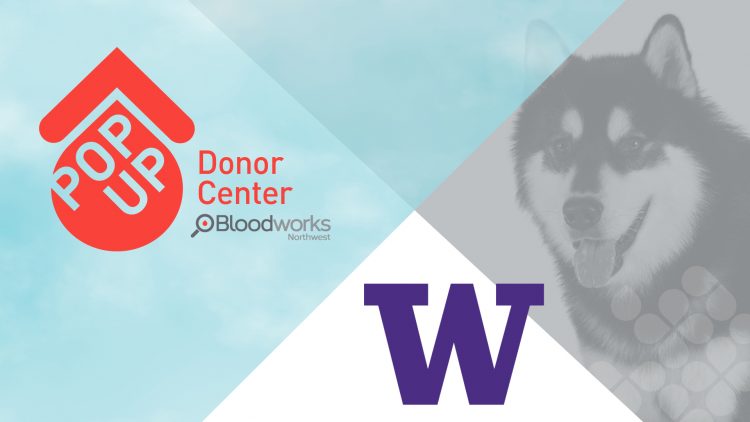May 1, 2023
Donate with Bloodworks Northwest
 Considering donating blood? There is always need for blood, platelet and plasma donations. Every time we donate one pint of blood, the potential is there to save three lives.
Considering donating blood? There is always need for blood, platelet and plasma donations. Every time we donate one pint of blood, the potential is there to save three lives.
Consider giving blood at a pop-up donation center on campus or in your neighborhood this spring! In partnership with Bloodworks Northwest, you can make a one-hour appointment to give blood, providing critical support to local hospitals and patients.
Type O Donors: As we emerge from our emergency blood shortage, there is still a high need for Type O donors to book appointments.
For the past two years or more, the American Red Cross has experienced the worst blood shortage in over a decade. Blood donations, including platelets and plasma, save lives and improve the health of millions of people worldwide.
Every two seconds in America, someone needs blood.
According to America’s Blood Centers, 65% of the U.S. population is eligible to donate blood, but less than 5% do, which is why spreading awareness is so essential. Indeed, the demand far exceeds the needs of those facing an unexpected emergency–some 1 in 7 people entering a hospital depend on a ready blood supply.
Cancer patients use a quarter of all blood donations while blood transfusions are needed in one out of every 83 newborn deliveries in America today, a rate that has increased by more than 50 percent between 2006 and 2015.
Complicating the issue is the fact that less than 20% of all blood donations each year come from individuals in communities of color; donations from individuals 19 and under have dropped nearly by half over the last two years. This reality has created an urgent need for younger, more diverse donors.
Blood facts
- Someone needs blood every two seconds in the U.S., and more than 4.5 million Americans would die every year without lifesaving blood transfusions.
- The American Red Cross needs 13,000 blood donations every single day to maintain an appropriate blood supply.
- The American Journal of Epidemiology reports that blood donors are 88 percent less likely to have a heart attack.
- People who begin donating blood at age 17 and donate every eight weeks will have donated 48 gallons of blood by age 76.
- Your dog can donate blood, too. Check with your veterinarian and the Humane Society to make sure you know the local rules and regulations for this type of donation.
You may still donate blood, platelets or plasma after receiving a COVID-19 vaccine. Knowing the name of the manufacturer (Pfizer, Moderna, J&J, etc.) of the vaccine is important in determining your blood donation eligibility. To learn more about the COVID-19 vaccine and blood donation, click here.
Blood is the most precious gift that anyone can give to another person — the gift of life. A decision to donate your blood can save a life, or even several if your blood is separated into its components — red cells, platelets and plasma (World Health Organization)
How you can help: Donate blood, money, or time
These nonprofit organizations are UWCFD members to whom you can donate directly through payroll deduction. Consider a monthly gift in addition to a regular blood donation:
The American Red Cross (charity code 0337346): a humanitarian organization led by volunteers, provides relief to victims of disaster and helps people prevent, prepare for, and respond to emergencies. The Red Cross provides about 40% of our nation’s blood and blood components, all from generous volunteer donors.
Schedule a donation appointment with The American Red Cross
Bloodworks Northwest (charity code 0316056): is an independent, community-based, nonprofit organization providing blood services to over 90 hospitals and conducting groundbreaking research in blood storage, transfusion, and hemophilia care.
Bloodworks is hosting multiple popup donation drives at the UW Tower and the business school this spring.
Blood Center Foundation of the Inland Northwest (charity code 1481726): raises funds and invests in health care education, technology and research grants in support of your regional community and Inland Northwest Blood Center.
Cascade Regional Blood Services (charity code 1481206): is the link between volunteer blood donors and life-saving blood transfusions.